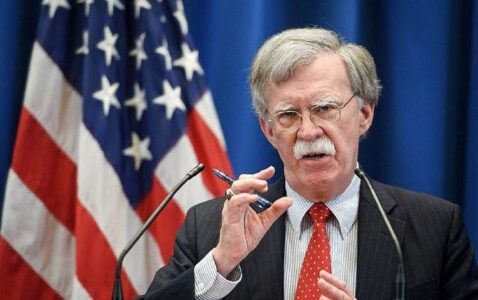
John Bolton: US alignment with Iran in fight against the Islamic State has strengthened Tehran’s influence
Former US National Security Adviser John Bolton sees his country’s previous cooperation with Iran-affiliated forces in the effort to defeat the Islamic State (ISIS) group as strengthening the Islamic Republic’s power in the region.
“I think this was part of the problem of aligning with Iranian forces, Iranian militias, Iraqi militias and Iranian regular military forces in the effort to destroy the ISIS territorial caliphate,” Bolton told Rudaw TV’s Dilbixwin Dara in an interview on July 28.
“What we were doing when Obama started this, I think unknowingly or at least inadvertently, was strengthening Iran’s hand across the region. And I think that is now coming back to haunt us,” added the former official who served as Trump’s national security adviser — a highly influential position close to the US president – from April 2018 to September 2019.
Since its formation in the wake of the war against ISIS, the largely-Shiite milita network the Popular Mobilization Forces (PMF), known in Arabic as Hashd al-Shaabi, have largely resisted integration into the Iraqi Security Forces (ISF). Units close to Iran are widely accused of abducting and killing protesters during Iraq’s recent wave of anti-government unrest, and refusing to withdraw units garrisoned in northern areas.
A staunch conservative seen as a “hawk” in the foreign policy arena, Bolton revealed that he wholeheartedly supports the US assassination of Iranian General Qasem Soleimani in a January drone attack in Baghdad.
“I think that [it] was the right thing to do and I wouldn’t rule out other steps against the Revolutionary Guard,” said Bolton who says he thinks the US should pursue policy to overthrow the Iranian regime.
“I think that one way that happens is if the regular military and the Revolutionary Guard fragments. So this could exacerbate the instability that already exists in Iran where I think the regime is very unpopular. And I think it should be,” he added, saying he does not think Trump is genuinely interested in the overthrow of the Iranian regime.
Bolton considers Iraq to have effectively broken up, saying if the State Department truly recognized the political reality on the ground it would, in his view, motivate Washington to support Kurdish statehood in Iraqi Kurdistan.
“I think given the policy of Iran in particular, there’s no effective way you’re ever going to see the kind of government in Iraq that we saw created at the end of World War I and that effectively ended, I think, with the overthrow of Saddam Hussein,” claimed Bolton. “So I think it’s unrealistic, but it’s because people haven’t fully appreciated the significance of de-facto Kurdish independence in northern Iraq for 25 plus years.”
Before he joined the US administration, Bolton supported the Kurdistan Region’s independence, unlike his government, who he said was dissuaded from support by the State Department.
“I thought the referendum, at least in principle, was a good idea to convince people of the strength of feeling among the Kurds for independence.”
“There was a lot of argument at that time that having the referendum would in fact play into the hands of the opponents of Kurdish independence. But I thought that really the Iranian Revolutionary Guards who did try and take advantage of the situation would have done something similar whether there was a referendum or not and that the referendum was simply a pretext for them to take steps they would have taken otherwise,” referring to the retaking of Kirkuk.
In terms of the US position towards the Kurdistan Region, Bolton said that the administration and the Congress have a great deal of sympathy for Kurds but may hold a simplistic view of the Kurdish case.
“It’s not a well-informed feeling… I don’t think it fully appreciates the difficult circumstances that Kurds find themselves in and I think there’s still a strong feeling that people hope that Iraq itself is not going to break apart,” added Bolton.
Commenting on the US withdrawal from Syria , he said “We persuaded him in fact that was not a great idea, but what played out over the next year was Erdogan and Turkey continuing to press for a withdrawal, and succeeding in late 2019…this is part of the difficulty of keeping Trump pursuing a consistent policy over a sustained period of time,” he added.
Source: Rudaw





